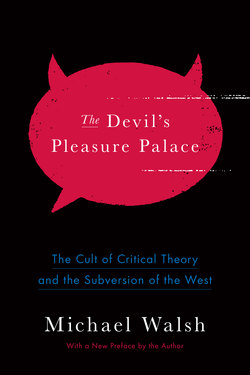Читать книгу The Devil's Pleasure Palace - Michael Walsh - Страница 10
На сайте Литреса книга снята с продажи.
ОглавлениеPreface to the Paperback Edition
The Devil’s Pleasure Palace is a book about Good and Evil, about the Fall of Man and our long journey home, and about how Art, not Science, is the medium best suited to steer us toward that beacon of magic fire which lights the path to redemption. Big themes, worthy of capitalization.
But rather than a single Virgil, conducting us back to the first principles of Western civilization from which our culture has sprung, the reader will encounter a score or more: Milton, Mozart, Schubert, Wagner, Goethe; Joseph Campbell; the philosophers of the Frankfurt School of Marxist intellectuals; Marcus Aurelius, Boethius; Hegel and Marx; Francis Ford Coppola and Walt Disney. Some are saintly, some diabolical—but all, in their fashion, have helped us understand the central questions of man’s existence: Why are we here, and where are we going? If it is not the Pilgrim’s Progress, it is at the very least the story of the Hero’s Journey, the hero in this case being all of us.
Please don’t be frightened by this ghostly parade of cultural icons; at heart, this is an adventure story, analyzed via the medium of the oldest of human activities, storytelling itself. Call it what you will—myth, legend, narrative fiction, faith—the human need for stories that help explain the human condition antedates organized religion by millennia. Tales of gods, monsters, and heroes extend back to Homer, the Celtic legends, and Nordic mythology. Each of them tells essentially the same tale, lays out a moral framework for life, and shows us how to achieve it.
And yet, too often we have ignored this most primal mechanism for self-understanding in favor of fashionable psychological twaddle, exacerbated by our perverse penchant to believe that each new generation casts off the antediluvian superstitions of the past and reinvents the world anew; the truth, therefore, must be the exact opposite of what hitherto we have all believed. Only in this way, goes the thinking, lies true enlightenment.
Balderdash. Innovation is always to be sought and admired, but the wanton destruction of the past in a fit of adolescent rebelliousness—fanned by those who would do the culture irreparable harm—must be rejected if the cultural-Marxist Left’s long march through the institutions is to be halted and reversed, as it must be if civilization is to survive.
The critical response to this meditation upon fundamental principles has been most gratifying. The book quickly found a place in the contemporary canon of conservative argument, was favorably compared to Allan Bloom’s The Closing of the American Mind, has stayed on various Amazon best-seller lists for nearly two years, and now appears in the paperback edition you hold in your hands.
This is a political book only in the largest possible sense, springing from my belief that culture produces politics, and not vice versa. You will not find a word herein about contemporary, and hence transient, political figures, or even specific issues. Rather, my attention was to directly challenge both our notions of public and foreign policy with this dagger at their heart: What, exactly, are we fighting for? For, without a sense of what is worth preserving, no country can have a sense of national purpose or identity. And thus its entire prior history is rendered worthless.
Here lies the threat: Wave after wave of what I dub “satanic” leftism—in the sense that Satan cannot create, but only destroy—has gradually eroded and undermined our own belief in ourselves. This book, then, is explicitly and implicitly an argument against globalism, one-worldism, cultural relativism, and fatuous moral equivalence—not just made by me, but by Roman emperors, medieval philosophers, cavaliers of the Enlightenment, nineteenth-century revolutionaries, and twentieth-century daemons. It is not for the squeamish, the dense, the dull, the ignorant, or the easily offended.
I hasten to add that, despite the theological issues treated within—inevitable in any discussion of both Paradise Lost and Faust—this is not a book about religion, except in the sense of narrative drama. Whatever your feelings about Christianity, it cannot be denied that the Jesus story, about a man learning first to understand and then embrace his destiny, is the story of just about every hero in Western literature, from Odysseus and Finn McCool to Tarzan of the Apes.
It is, however, a call for a new Counter Reformation, an engagement with the inimical intellectual and cultural trends that have some Western Europeans and Americans questioning their reason for existence—or, at the very least, making them feel guilty about it. It is at once a call to faith, and a call to arms.
In a companion volume—The Fiery Angel, which is forthcoming—I will lay out more specifically the nature of this restoration. For now, however, enjoy the story of man’s first disobedience, the fruit of that forbidden tree, and the Faustian bargain that has led us straight into the hell of the Devil’s Pleasure Palace.
